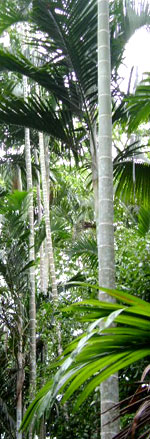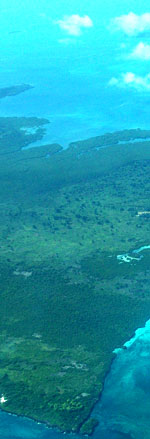WORK BEGINS TO CONSERVE THE THREATENED PEMBA PALM IN TANZANIA
Threats to Dypsis pembana, a Palm tree found only on Pemba island, Tanzania, are increasing. With fewer than 3,000 trees remaining, a new Global Trees Campaign project aims to plant trees, reduce threats and ensure long term security of the tree's habitat.
The Pemba Palm (Dypsis pembana) is a narrow endemic, found only on Pemba, a 920 km2 island lying 50km off the coast of Tanzania. The species, which is thought to have a population of fewer than 3,000, is mainly confined to small forest patches in the North of the island, such as the 1,975 ha Ngezi Vumawimbi Forest Reserve. The reserve also hosts Zanthoxylum holtzianum, a very little known medicinal tree species thought until recently to occur only in mainland Tanzania. Other significant forest patches in the north of the island include the Msitu Mkuu Forest Reserve (300 ha) and Ras Kiuyu Forest (approx 200 ha) which also host Zanthoxylum holtzianum and endemic Aloe pembana. In addition to plant species, these protected areas harbour significant varieties of endemic mammals, reptiles and birds such as the Pemba Flying Fox, Pemba Blue Duiker, Pemba Scops Owl, and the Pemba Day Gecko.
The increasing human population in the area is leading to unsustainable logging, over-collection of forest products and clearance of the forest for agriculture. In addition, forest fires and the invasive plant Maesopsis eminii are threatening native species. In response to these threats the Global Trees Campaign, working with local partner the Department of Commercial Crops, Fruits and Forestry (DCCFF), Zanzibar has begun work to increase the long-term security of the Pemba Palm’s habitat, reduce threats to the species and establish tree nurseries in local communities.
There will be three community nurseries, which aim to produce a total of 20,000 seedlings of threatened native trees such as the Pemba Palm as well as economically important fruit trees. The project will also carry out surveys to assess the current status of the Pemba Palm in the wild, as well other species such as Zanthoxylum holtzianum. Awareness raising activities in schools and communities will ensure that local people play a key part in the conservation of the forest. Community members will be trained in effective forest fire management and will continue to take part in the eradication of the invasive plant Maesopsis eminii.
The project will run for two years, from early 2009 until December 2010.
Read more about FFI's work with the Pemba flying fox
Back to Latest News
|


|







